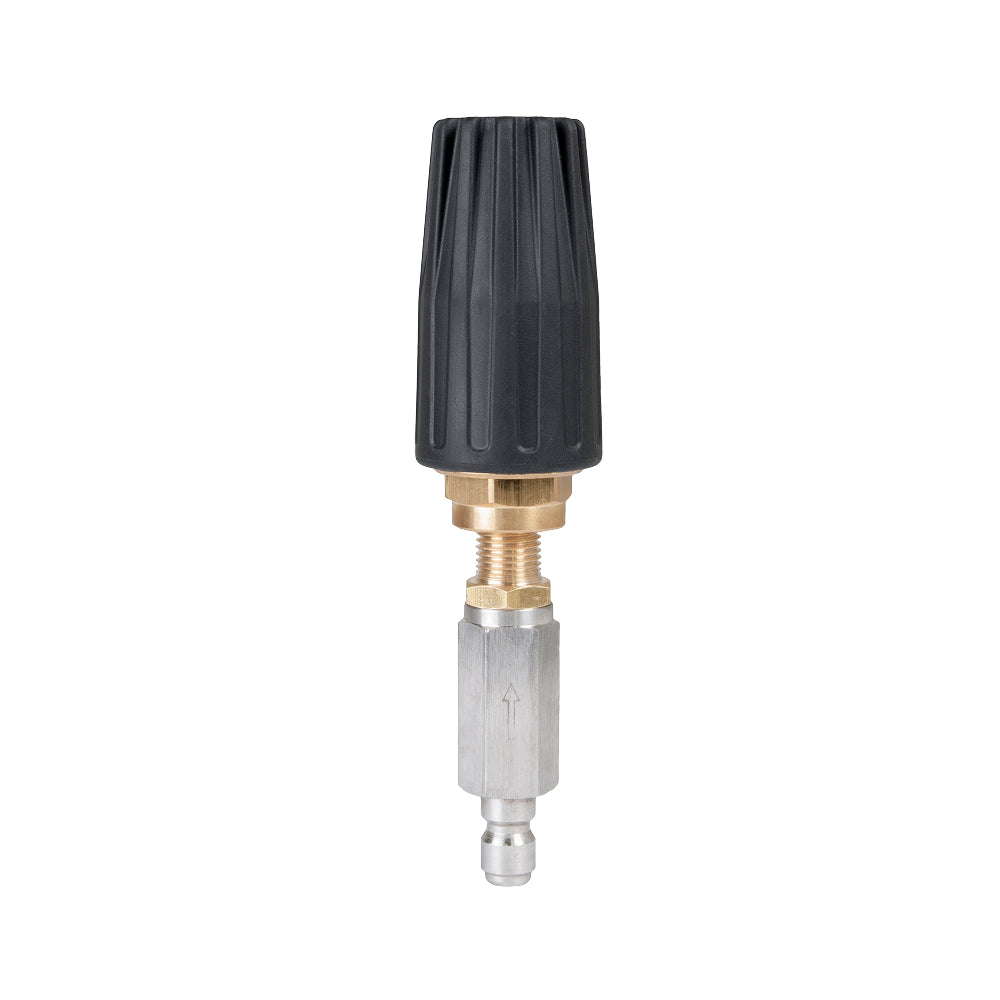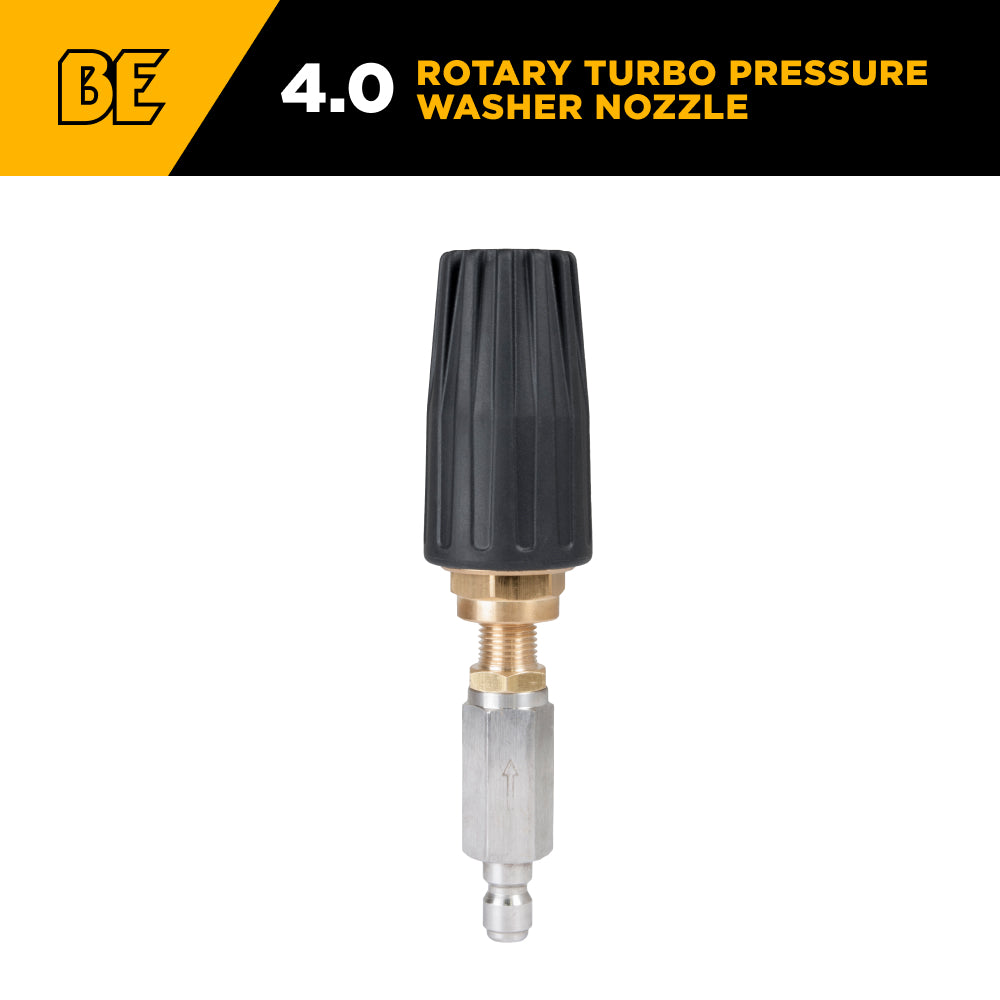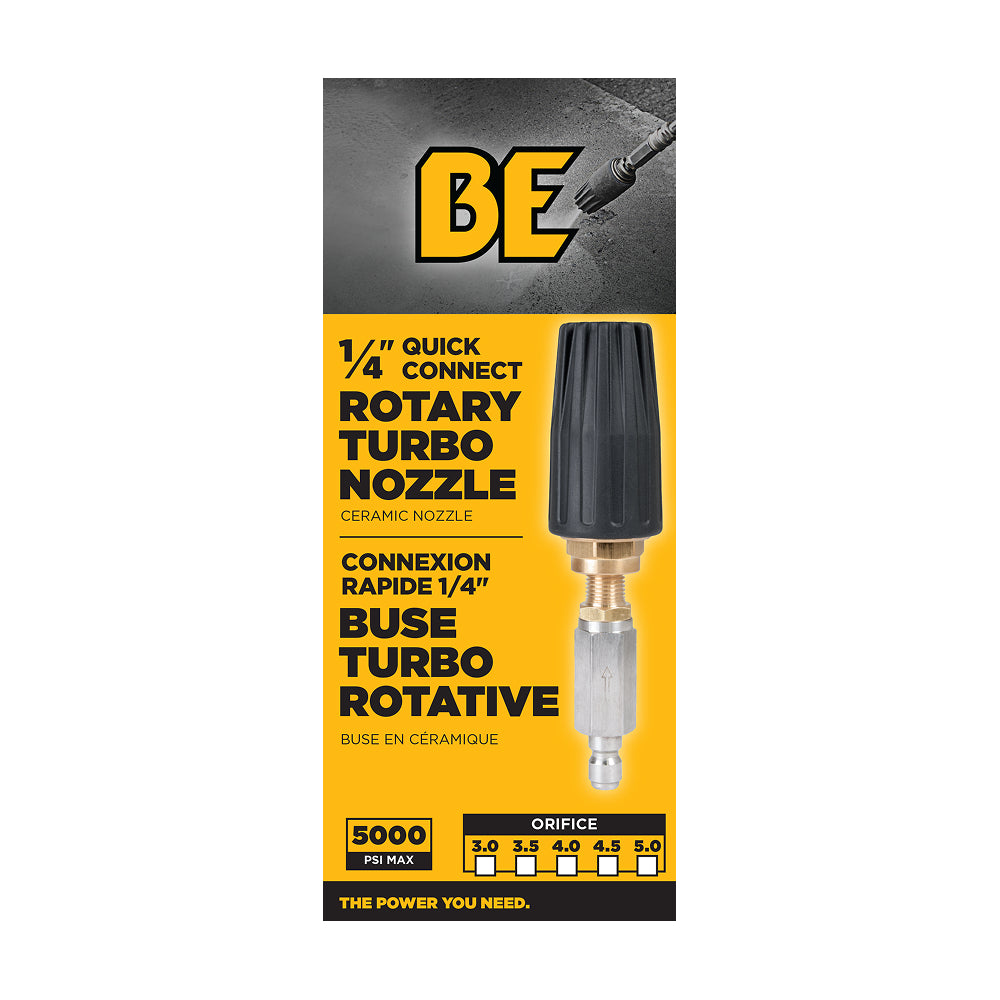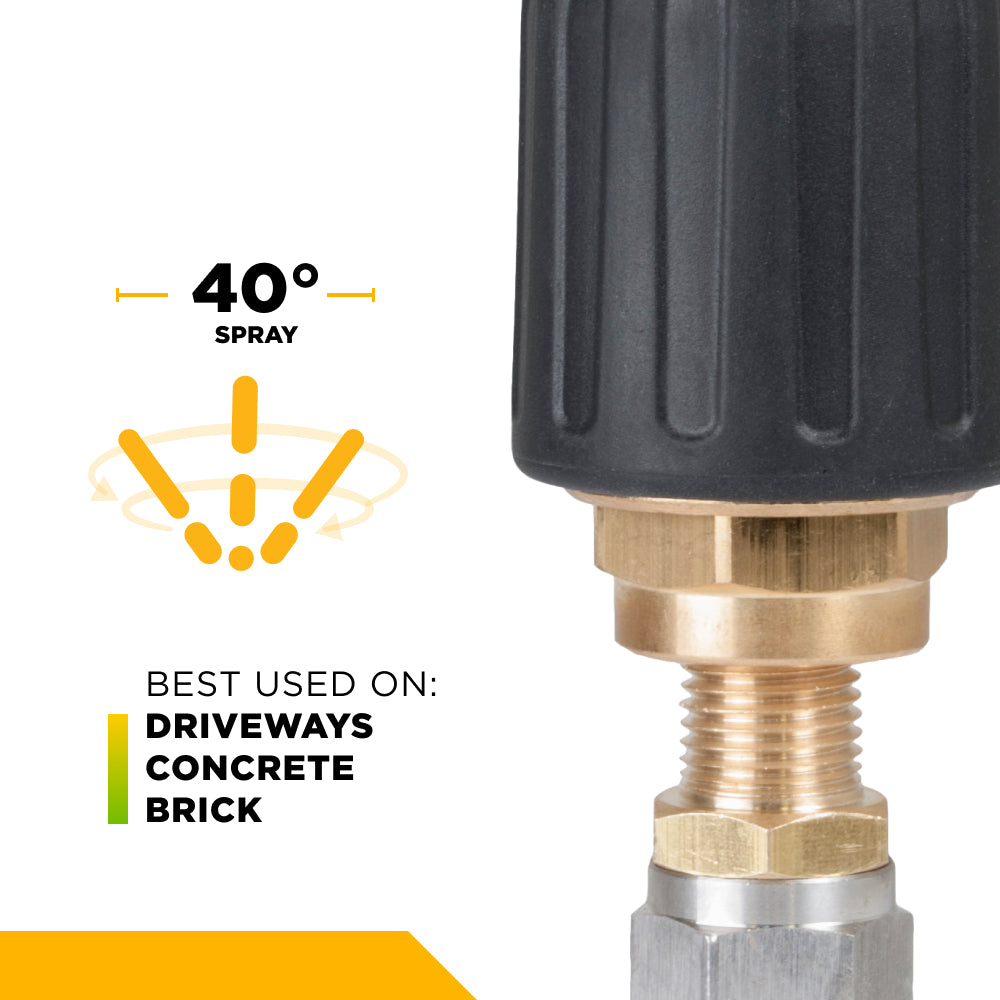PRODUCT
DESCRIPTION
High-Powered Rotating Jet for Maximum Cleaning Efficiency
The Rotary Turbo Pressure Washer Nozzle with a 4.0 orifice is engineered to deliver aggressive, high-speed cleaning for the toughest outdoor jobs. By combining the focused intensity of a zero-degree jet with a rotating circular spray pattern, this turbo nozzle cuts through grime, mud, mold, and stains with exceptional efficiency. A built-in inline water filter is integrated into the nozzle to help protect your pressure washer system by preventing debris and contaminants from entering and causing clogs or internal wear. This makes it an ideal solution for deep cleaning driveways, sidewalks, patios, and other durable hard surfaces where standard nozzles fall short.
At the core of the turbo nozzle is a high-speed ceramic spray tip that rotates continuously, creating a powerful scrubbing action that cleans significantly faster than a fixed spray nozzle. The rotating circular spray pattern maximizes pressure output while expanding coverage, allowing you to remove stubborn buildup in less time and with less effort. The addition of the inline filter improves reliability when working in job-site conditions or areas with inconsistent water quality.
This nozzle features a 4.0 orifice, calibrated for pressure washer systems that require this specific flow rate. Its balanced design makes it well-suited for professional contractors, facility maintenance teams, and homeowners who demand strong, consistent performance for challenging outdoor cleaning tasks.
Due to its extreme cleaning power, the Rotary Turbo Nozzle should be used with caution on delicate surfaces and is not recommended for wood, siding, or painted finishes. For safe operation, begin spraying from a greater distance and move closer gradually as needed. Always point the spray gun downward before pulling the trigger to ensure the ceramic spray tip is properly seated in the forward position, helping prevent internal damage and ensuring smooth startup.
Key Features
-
Rotating zero-degree jet delivers maximum cleaning intensity
-
Turbo circular spray pattern cleans faster than standard fixed nozzles
-
Integrated inline water filter protects against debris and contaminants
-
High-speed ceramic internal tip for long service life
-
4.0 orifice calibrated for compatible pressure washer systems
-
Ideal for driveways, sidewalks, patios, and other hard surfaces
-
Not recommended for wood or delicate materials
The actual product may vary from the images shown on the website.
Frequently Asked Questions about Pressure Washers
How to store a pressure washer?
To ensure the durability of your heavy duty pressure washer:
- Empty the gas tank to prevent fuel from degrading or clogging the engine.
- Empty the pump and hoses of any remaining water.
- Perform necessary maintenance before storage.
- Store in a dry area.
- Cover.
What is a pressure washer?
A power washer is a cleaning machine that uses a gasoline engine to power a high pressure water pump and nozzle. It’s used to clean driveways, decks, vehicles, outdoor furniture and more by spraying water at high PSI to remove dirt, grime, mold and other debris.Many models also come with a detergent tank for added cleaning power.
How does a power washer work?
A power washer works by drawing water from a connected hose and pumping it through a high pressure nozzle. The gas engine powers the pump which pressurizes the water and then expels it through the nozzle at high speed to clean the surface. The water pressure is measured in PSI (pounds per square inch) and the flow rate is measured in GPM (gallons per minute).Many models also feature adjustable water pressure settings to cater to different cleaning needs. BE makes pressure washing easy with models available for light jobs and heavy duty commercial cleaning projects.
Gas vs Electric power washers?
The main difference is that a gas pressure washer, known for its cleaning power, is powered by a gasoline engine, making it more powerful and portable, while an electric pressure washer is powered by electricity and is generally quieter and lighter.
Gas pressure washers are for heavy duty and large areas due to their durability, whereas electric pressure washers are for smaller jobs.
Your BE electric pressure washer is perfect for smaller jobs and built for portability, and we offer a wide range of electric models. Included with our electric models is a long extension cord for use anywhere around your house.
What to consider?
When choosing a gas pressure washer consider:
- Pressure (PSI): More PSI means more cleaning power but also more potential for damaging delicate surfaces.
- Flow Rate (GPM): More GPM means faster cleaning as more water is dispensed.
- Engine Power: Bigger engines mean more durability and power.
- Portability: Weight, handle design and wheel size for easier to move.
- Nozzles: Multiple spray nozzles to adjust the spray pattern for different tasks.
- Adjustable Nozzle: Allows for fine-tuning the spray intensity and pattern for various cleaning needs.
How much pressure do I need for?
The required pressure (PSI) and cleaning power depend on the surface you’re cleaning:
- Light duty (car washing, outdoor furniture): 1,300-1,800 PSI.
- Medium duty (patios, fences, decks): 2,000-3,000 PSI.
- Heavy duty (driveways, brick walls, large equipment): 3,000+ PSI.
Many pressure washers come with adjustable pressure settings to handle different cleaning tasks effectively.
Can a pressure washing damage surfaces?
Yes, a power washer can damage surfaces if used incorrectly. High pressure water can strip paint, dent soft surfaces or even cause structural damage if the pressure is too high or the nozzle is held too close to the surface. Always use the right PSI for the material you’re cleaning and keep a safe distance from delicate surfaces.
To prevent damage, consider using a model with adjustable pressure settings.
How to maintain your pressure washer?
To ensure the durability and smooth operation of a pressure washer:
- Change the oil as per manufacturer’s instructions.
- Clean or replace the air filter to ensure good airflow.
- Inspect and clean the nozzle regularly to prevent clogs.
- Drain the gas tank if you’re storing the washer for a long time.
- Check the hoses for leaks or damage and replace them if needed.
- Follow regular maintenance requirements to keep the washer in optimal condition.
Can I use a pressure washer in cold weather and low water temperature?
You can use a pressure washer in cold weather but it’s more difficult. The water flow rate in the hoses and pump can freeze and damage the equipment. If you plan to use your pressure washer in cold temperatures make sure to winterize it and store it in a warm area when not in use. You can also use anti-freeze solutions for pressure washers.
Some models are designed to use hot water, which can be particularly effective for cleaning in cold weather.
Do I need any accessories?
Common accessories for power washers:
- Different nozzles (0°, 15°, 25°, 40°, and soap nozzle) to adjust spray patterns.
- Extension wands for hard to reach areas.
- Surface cleaners for large flat areas like driveways and decks.
- Hose reels to store hoses neatly and prevent tangling.
- Foam cannon or detergent bottles for soap or cleaning solutions.
- Detergents for cleaning a wide variety of surfaces.















